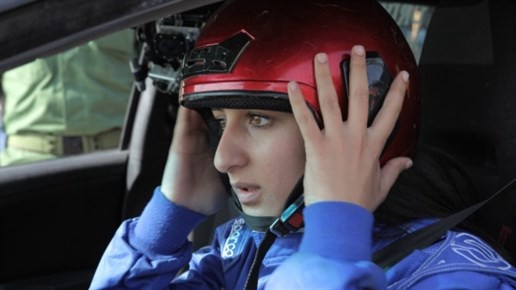Amber Fares is a Canadian-born filmmaker with Lebanese roots. In the aftermath of 9/11, Fares left her career in marketing to deepen her understanding of life in the Middle East. In response to her experience, Fares co-founded SocDoc Studios to produce story-driven films that explore social issues. Her directorial debut short, “Ghetto Town” (2009), has been shown at film festivals around the world. “Speed Sisters” is her first feature-length documentary. (Press materials)
“Speed Sisters” will premiere at the 2015 Hot Docs Film Festival in Toronto on April 29.
W&H: Please give us your description of the film playing.
AF: “Speed Sisters” is about the first all-women race-car driving team in the Middle East. They are five women from the Palestine who are living their lives on their own terms in a place where life is highly controlled by a military occupation. When they first joined the races, they surprised their communities and other racers, but they quickly found their place in the heart of the gritty, male-dominated Palestinian street-racing scene.
W&H: What drew you to this story?
AF: In the aftermath of 9/11, I have wanted to tell a story that would bridge the ever-growing gap between the Arab world and Canada, where my family lived. To put it mildly, perceptions of Arabs in countries like the US and Canada were skewed. When I came across the Speed Sisters, I realized that I found a story that could help bridge that gap. I liked the idea that these women were doing something that was completely unexpected. When people think of Palestine, they don’t normally equate it with race-car driving, let alone women racing. I saw an opportunity for a surprising story from the Middle East that people all over the world could relate to.
On a personal level, I saw a lot of myself in each of the girls. I also grew up playing a lot of sports, so I could really relate to that element of competition and making a comeback. I could also relate to decisions about love and marriage and friendship, which are obviously universal. This is one of the strengths of the film. We will all see ourselves in at least one of the characters, regardless of if their world is foreign to us.
W&H: What was the biggest challenge in making the film?
AF: Navigating the industry as a first-time filmmaker is a big challenge. I knew we had a great story and wanted to do something unique, but there were obstacles along the way that really pushed me to stay true to the vision and trust my instincts. Fortunately, the documentary-film community is a generous one. Experienced filmmakers and funders were incredible mentors and offered invaluable support, advice and tools along the way.
In terms of production, the races were incredibly challenging to shoot. We were following all five women both on and off the track, while trying to capture the atmosphere of the races. And the fact that we were filming in extreme heat didn’t help, either! In the early days, we didn’t have enough of a budget to hire a film crew, so often it was just me with a camera and someone helping me with the in-car cameras. As we raised money through crowd-funding, we were able to bring more people on board.
W&H: What do you want people to think about when they are leaving the theatre?
AF: Obviously this film will break stereotypes of Arab women, and hopefully of Arab men as well. I guess I want people to be entertained and inspired and think, “Wow, those women are really badass, and they are following their dreams despite the obstacles of life in Palestine.”
W&H: What advice do you have for other female directors?
AF: I think my advice for female directors would be the same as my advice for any director. No one knows or cares about your film as much as you do. Never take no for an answer and trust your instincts — especially first-time filmmakers. There is no set way to do anything. Trust your instincts and act on that.
W&H: What’s the biggest misconception about you and your work?
AF: I think that because video technology is so accessible, everyone thinks films are easy and cheap to make.
W&H: How did you get your film funded? Share some insights into how you got the film made.
AF: “Speed Sisters” is an independent film produced by SocDoc Studios, the company my producer Avi Goldstein and I co-founded. Based on preliminary footage that we shot, we secured critical development funding from several international film funds that helped us pursue the process of honing our story and shooting and editing footage for further production fundraising.
We ran two crowd-funding campaigns two years apart that provided critical funding for our production. In total, we crowdfunded over $130,000 from more than 600 people in 30 different countries — support that was critical for keeping the production going. With more edited footage, we were able to raise key production and post-production funding from film funds, foundations and some independent backers.
Many people in and around the team put in a lot of sweat equity, in-kind contributions and deferred their payments — and we benefited greatly from the generous spirit of the documentary community in receiving invaluable mentorship, advice and assistance all along the way.
W&H: Name your favorite woman-directed film and why.
AF: I love “Caramel” by Nadine Labeki. It’s a very simple story set in Lebanon at a time when there was a lot of optimism in that country. Nadine is a beautiful storyteller, and that film really was a special portrayal of the kind of relationships that women have with each other.







